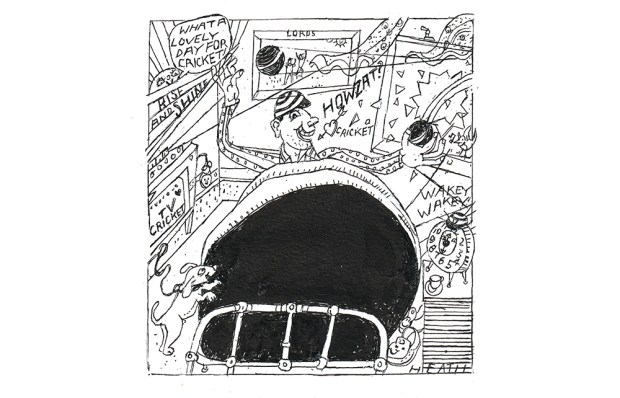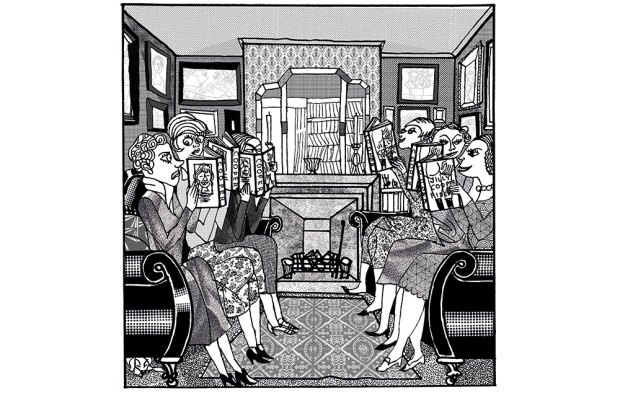The current Ashes series is proving a once-in-a-generation classic, one of those contests that cricket fans spend decades dreaming about. How are some of those fans reacting? They’re refusing to watch.
I’m talking about the ‘I just can’t stand the tension’ brigade. The ones who, when the run chase gets down to 30 with three wickets left, run from the room shouting: ‘It’s no good, my nerves won’t take it.’ They pace up and down, fingers in ears, determined to avoid learning the result until the match is over. Only then do they creep back in and discover the news.
It’s madness. You wait years for the drama of a truly great sporting event – and then when it arrives, you shun it. Yes, your palms are sweating and your heart’s about to burst, but isn’t that the point of sport?
The latest person to confess his lunacy is Test Match Special’sDaniel Norcross. Had he not been working on the third Test at Headingley, he says, the anxiety of the final session would have proved too much, and he’d have been unable to carry on watching.
‘I know it sounds mad,’ he tells me, ‘but I reserve my insanity for extreme situations. I was perfectly willing to watch the finales at Edgbaston and Lord’s [the first two matches], but this was different. If England had lost, the Ashes and in essence the summer would have been over. The stakes were simply too high. I needed to disinvest, as the consequence of my engagement was that I stood to lose everything I hold dear.’
Norcross has form – and early form at that. ‘The 1982 Melbourne Test match, I was 13,’ he says. ‘We were spending Christmas in Wales, and my dad and I were listening on the radio. The Aussies were chasing in the fourth innings, and as they got closer to pulling it off we decided we just couldn’t take any more. So I got my cassette player, put it next to the radio and started taping, then we went out for a walk. It was one o’clock in the morning. The sheep were very confused.’
The cassette was a C90, so Dan and his father knew it would run out after 45 minutes. When that time had elapsed, they returned to the house, discovered that England had won by three runs (it’s still seen as one of the most thrilling matches ever), and settled down to listen to the recording. Didn’t they feel robbed of the excitement, knowing what the result would be? ‘Oh no. I’m never like that when I’m watching a match back. In fact I enjoy it all the more, knowing what to look for because I know what’s going to happen.’ This just about sums it up. Would Norcross deliberately find out the plot of a film he’s about to watch, in case there are any of those horrible ‘surprise’ things?
Someone who did turn his back on the Headingley match was the England captain Ben Stokes, who (unlike four years ago at the same ground) had been dismissed. ‘I walked about 2km around the dressing room in the last half-hour,’ he admitted last week. ‘I didn’t watch the last 20 runs being scored. It’s a completely different place when you can’t do anything, you can’t influence the game any more.’
Fair enough. You can understand professional sportsmen averting their gaze, for Stokes’s reason or to provide a break from the concentration that saps their energy all day. Some snooker players make a point of not watching their opponent at the table, to keep themselves alert for their next shot.
But fans? What’s their reasoning? Football supporters are often the same, refusing to look during penalty shoot-outs. The DJ John Peel was one such, sometimes leaving the house (à la Norcross) when a match featuring his beloved Liverpool entered squeaky-bum time. Health concerns are often cited: Peel explained in his autobiography that he avoided matches because watching them would get him ‘more wound up than was good for me’.
Perhaps. At the 1882 Oval Test (the one that gave birth to the Ashes), things became so tense that one spectator died of a heart attack (and another chewed through his umbrella handle). But assuming fatality is unlikely, it all comes down to the moral contract of despair vs joy. If you cut yourself off from the possibility of the former, do you retain the right to enjoy the latter? Surely only those of us who have the courage to keep watching can really savour a victory?
During the 2005 Ashes, I planned my blinks as the bowlers were running up, so determined was I not to miss any of the action. I was there, living every moment, in the moment. But the shirkers, the lookers-away – how can they claim to be proper supporters?
Cometh the hour, cometh the fan.
Got something to add? Join the discussion and comment below.
Get 10 issues for just $10
Subscribe to The Spectator Australia today for the next 10 magazine issues, plus full online access, for just $10.
You might disagree with half of it, but you’ll enjoy reading all of it. Try your first month for free, then just $2 a week for the remainder of your first year.














Comments
Don't miss out
Join the conversation with other Spectator Australia readers. Subscribe to leave a comment.
SUBSCRIBEAlready a subscriber? Log in